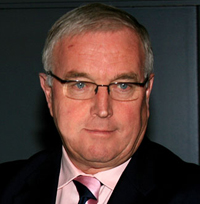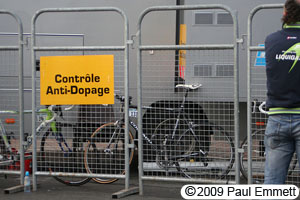 International Cycling Union (UCI) president Pat McQuaid has commented again on the ongoing struggle between the UCI and the French Anti-Doping Agency (AFLD). The dispute dates back to the 2009 Tour de France, where the AFLD and the UCI worked in partnership to collect samples during the race. The French agency was critical of the UCI in a report published in October last year. Among other things, the AFLD accused the UCI of preferential treatment of the Astana team of race winner Alberto Contador and seven-time-winner Lance Armstrong, who finished third.
International Cycling Union (UCI) president Pat McQuaid has commented again on the ongoing struggle between the UCI and the French Anti-Doping Agency (AFLD). The dispute dates back to the 2009 Tour de France, where the AFLD and the UCI worked in partnership to collect samples during the race. The French agency was critical of the UCI in a report published in October last year. Among other things, the AFLD accused the UCI of preferential treatment of the Astana team of race winner Alberto Contador and seven-time-winner Lance Armstrong, who finished third.
At the 2008 Tour de France, where AFLD had sole responsibility for collection and testing of samples, there were a number of high-profile positive tests; including some for the then new EPO variant CERA. In 2009, when the UCI was once again in control of collection and testing, there were none.
McQuaid in an interview with AFP, published in French sports paper l’Equipe, outlined exactly why the UCI will not be collaborating with the French agency this July.
“In our eyes, they [AFLD] no longer have any credibility because of the way they behaved with the UCI last year,” he said. “A year ago, I had meetings with the AFLD about the proposed anti-doping program pre-Tour de France. They wanted information to locate the riders who trained in France, which we have done every day. But it was later discovered that despite all the information they had conducted only 13 tests, five of which were unusable due to a breach of confidentiality. Just that was enough in itself to show the lack of seriousness in their approach.
“During the Tour de France,” he continued, “while three of their doctors were working with us, some problems occurred. I spoke directly with the AFLD, and for me it was an end to it. We discovered afterwards that their doctors reported to Paris about little things here and there, which is fine if the actual report was introduced to us and if we could discuss it. Normally, a collaboration works like that, but before giving it to the UCI they gave their report directly to the media. This shows that there was malicious intent to destroy the credibility of the UCI anti-doping programme.”
 Since the AFLD report was published there has been a series of statements released by both agencies, criticising each other, and relations have soured further. “We responded with our own report,” continued McQuaid, “in which we have took apart most of the points they had raised. I said it was impossible to work with a national anti-doping agency that behaved like this, although we have very good collaborations with others in the world.
Since the AFLD report was published there has been a series of statements released by both agencies, criticising each other, and relations have soured further. “We responded with our own report,” continued McQuaid, “in which we have took apart most of the points they had raised. I said it was impossible to work with a national anti-doping agency that behaved like this, although we have very good collaborations with others in the world.
“This was not the first time; there is a long history with the AFLD,” he said. “Like last year: they wanted information to locate the riders before the Tour, which we gave them. We have no problem with national agencies, including the AFLD, when it does its work within its territory; the clash comes when it wants to do the work of an international federation.”
There have been some criticisms in the media that an end to the collaboration between the UCI, as governing body of cycling, and the AFLD, the national anti-doping agency of the country that hosts the sport’s biggest race.
“I do not agree at all,” responded McQuaid. “Under the rules of WADA [World Anti-Doping Agency – Ed], if you have a positive test on the Tour or any other race, the result reaches the WADA and the UCI. The UCI has no other choice than to treat it like this. If it did not, WADA would ask us what is happening.
“It's the same thing with the biological passport. Our record this year shows: when we have had positive cases, they have been announced and we've been busy. How to be more transparent? We will have a team of independent observers from WADA. WADA is independent of the UCI, and it will check that everything is done correctly every day.”
The have been a number of criticisms of the recently announced list of riders who are under investigation due to abnormalities on their biological passport. In the case of Liquigas-Doimo rider Franco Pellizotti, his proflie showed abnormalities before the 2009 Tour but he was only accused of doping on May 3, almost a year later. It also did not go unnoticed that the names of the suspected riders were released just a few days before the start of the Giro d’Italia, Italy’s biggest race, where Pellizotti was expected to be one of the favourites.
“It's difficult because each case is different,” responded McQuaid. “Each batch of results that experts see is individual. From there, they can ask for a concentration of controls on that rider; they may request more information on the tests. There is also the 30 days to respect (the rider is notified and has one month to respond, Ed). All this takes time.
“But in the case of Pellizotti,” he explained, “he knew for a long time that he was suspected, that we were working on his case and that his blood parameters were abnormal. Two months earlier he received a letter asking him to explain why his parameters were at the limit. The announcement of his case had nothing to do with the fact that the Giro started five days later. In the passport system, I do not see how we can speed things up."